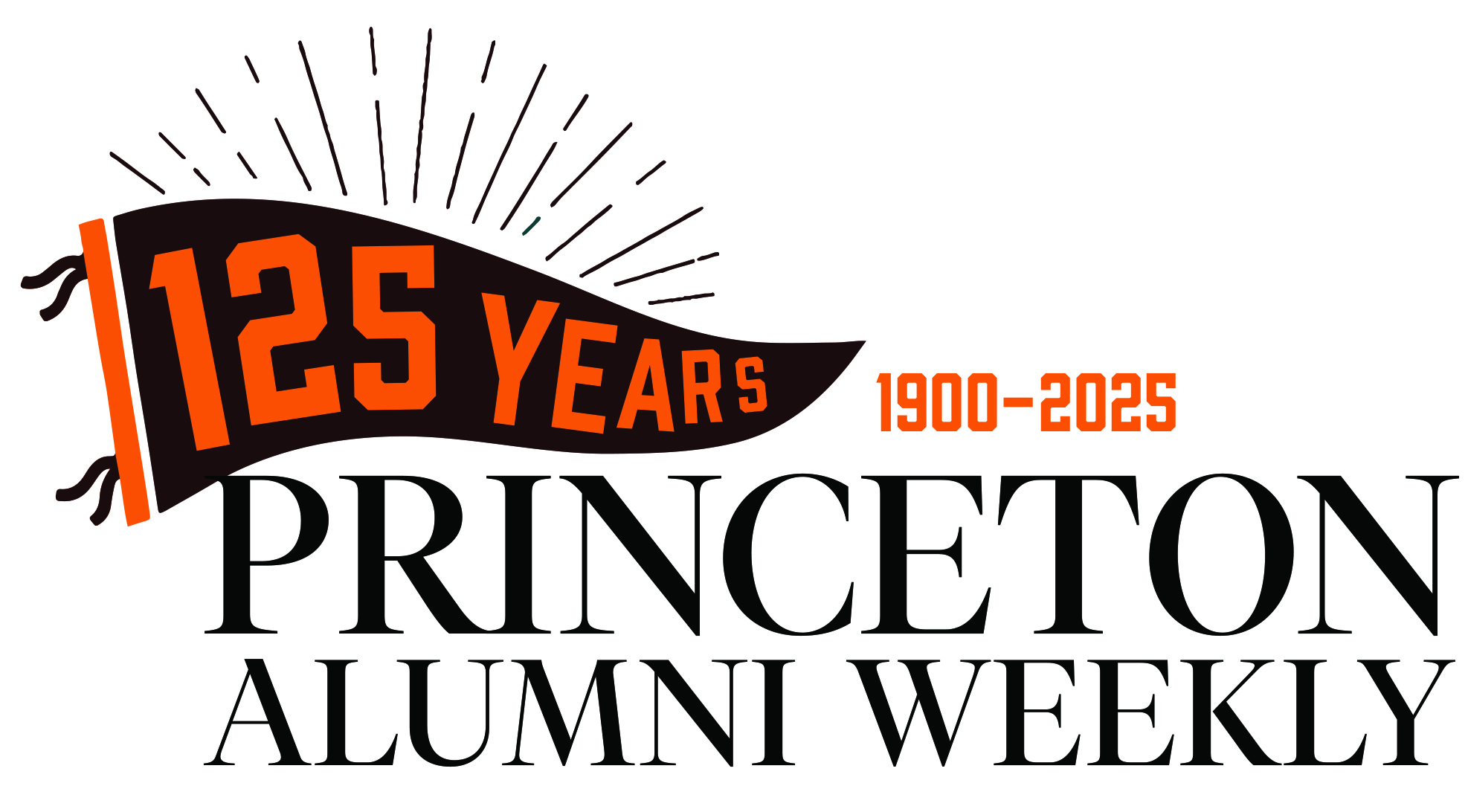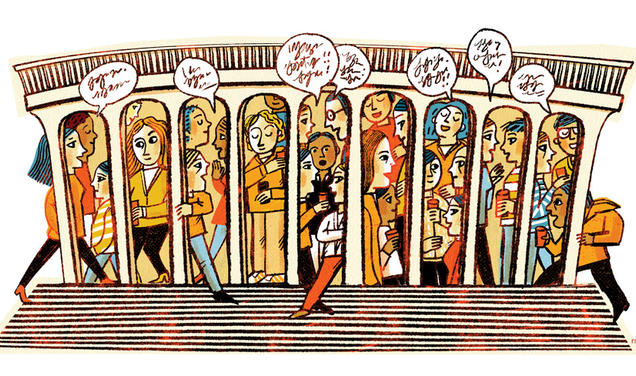Rally ’Round the Cannon: Princeton [Your Motto Here]
Friends, Homo Sapiens, Countrypersons, Lend Me Your Facebook Livestream

What’s in a name?
— Juliet, Romeo and Juliet, Act II, Scene II
I’ve spent a significant portion of this academic year bemoaning the appalling gaps in the historical knowledge and understanding of my beloved alumni readership, who have shown surprise at Woodrow Wilson 1879’s bigotry, at Aaron Burr Jr. 1772’s parentage, at the difference between the A-bomb and the H-bomb, and more — all the while encouraging increased vigilance in understanding history and, just to be fair all around, vigilance in imparting history by those of us who wish to attempt it, which should be all of us. We need to seriously up our game. This was in fact the theme of the open letter I wrote to the Woodrow Wilson Legacy Committee earlier in the year, and the principal reason I felt the need to offer it publicly: What to do with Wilson’s historical baggage, or slave-owning John Witherspoon, or anti-Semitic bicker committees is a question that requires knowledge before it allows pontification.
This rumination on the inescapable import of historical substance is to soften you up for our big surprise: Today we stick to semantics, symbolism for symbolism’s sake. (You want substance, go check the strong new exhibit on Wilson in the Bernstein Gallery of Robertson Hall.)
The University Trustees started this (nyah, nyah, did too …) by proposing something unexpected in the Wilson Legacy Committee’s report: They changed the University’s informal motto. Not Dei sub numine viget, the actual motto; not Vet Nov Testamentum, the dedicatory inscription on Princeton’s seal, which certainly will get a review at some future point when someone realizes it’s overtly Christian. Nope, it’s Wilson’s Princeton in the Nation’s Service, watchwords that titled his Sesquicentenary address in 1896, and which guided the molding of the new Princeton during his presidency from 1902-1910 and for the rest of the 20th century. Even in 2004, Robert Goheen ’40 *48, Wilson’s great successor, noted, “I thought to myself, ‘Well, look, Princetonians have never looked on themselves as anything more than servants, rather than guardians [of a sacred culture or tradition].’ ” It was, plain and simple, the perfect aspirational concept for an institution striving for import in an age of exploding knowledge and a shortage of wisdom.
So of course, then we changed it. The service part was fine – it was actually the entire point – but the nation part apparently bugged some folks. Now, back in 1896 the nation was, for all practical purposes, the apex of human endeavor; Wilson’s fourteen points were still 20 years away, there was rampant gung-ho imperialism everywhere, kings and czars and what have you were around to compare to our Republic, and the motto’s idea was to strive to benefit people at the highest level. The nation seemed to be only way to go.
Goheen himself, born and raised in India and a veteran of the great global cataclysm, World War II, certainly didn’t feel bound by strictly American values. He began to build a true University that saw the opportunity to serve in an expansive range of ways, from what we now know as the cosmic background radiation of the Big Bang – first hypothesized at Princeton during his administration – to plumbing the great wisdom of those whose impact envelops our entire species, from Greek Sophocles (Goheen’s great love) to English Chaucer (with the wonderful John Fleming *63). In this endeavor, the United States – or any nation – was a convenient home base, not the ultimate end game.
Do you have a recommendation for Princeton’s motto? Post it in the comments below.
By the time of the Bicenquinquagenary in 1996, the yearning for updated precision was apparently irresistible, so at the urging of Princeton’s Canadian-born president Harold Shapiro, the trustees expanded the motto to Princeton in the Nation’s Service and in the Service of All Nations, a more accurate description of reality to be sure. This preserved the original literary phrase within the new global outlook, but at a semantic cost. First, those pesky national aspirations were still there (what about the U.N. or the European Union?), despite intellectual activities at the University ranging from the level of mapping individual synapses, to correcting global ecosystems, to physically defining the dark energy a billion light-years away. Second, it grew the motto 140 percent, and it began to seem more like a strategic laundry list than a catchphrase (“A rose or any other flower by any other name or names would smell as sweet”). And third, it was structurally redundant, in that the United States was part of “all nations,” right? Messy.
That may have been part of the impetus this time around; after a 100-year initial run, the new version lasted only 20 years. The final report of the Wilson Legacy Committee actually gets the 1996 motto wrong — they dropped the second “in,” the same mistake I made in my first draft of this column. Following up on a suggestion by Justice Sonia Sotomayor ’76, the committee shifted the emphasis away from nationality to Princeton in the Nation’s Service and the Service of Humanity. Verbiage is down 16 percent — not a bad thing; some honest mistrust of governmental entities (outside the United States at least) is hard to argue; and humanism is a safely broad goal, maybe even more than that in a relentlessly mechanized, digitized age. But a couple interpretive issues still nag, even as the stone carvers go to work on the beautiful new flagstone plaque for the front campus:
- Doesn’t “service of humanity” actually include “the nation’s service”?
- This is a big universe; do we really want to limit ourselves to humanity? (Aren’t there marmosets whose company you’d prefer to that of certain humans?)
Now, Mom taught me not to open my mouth and criticize if I didn’t have an alternative idea, so I’ve spent some time considering other forms of the service motto, just to see how substantial or frivolous the upside might be. (I’ll bet the Wilson committee did exactly the same.) Rather than present a single conclusion, here are some alternatives:
Princeton in the Service of the Nation and Humanity – One phrase instead of two (good); redundancy remains (meh).
Princeton in the Service of Humanity – This take finally surrenders the idea that Wilson’s original phrase must remain intact within the new motto; instead it eliminates the redundancy noted above. Only 16 percent longer than the original.
Princeton in Global Service – Reinterprets it for a 21st-century world, also tacitly gives the marmosets, acacias, and ozone layer equal billing with people. Bonus points: It’s 20 percent shorter than the 1896 version, and great for tweeting.
Princeton Serves – 60 percent shorter! But I think this overplays the brevity, and ends up more appropriate for the gateway to the Lenz Tennis Center.
Princeton Serving the World – More poetic and specific than the last version, but uncomfortably reminiscent of waiting for your number to be called at the deli.
Princeton at Your Service (or the convenient Web version, Princeton @ Your Service) – On the positive side, it personalizes the message, but probably confuses things too much by shifting emphasis to the beneficiary from the servant, for whom this is supposed to be a call to action.
Princeton = Service – I originally stumbled into this as a joke on the STEM folks, but it sure does have clarity; it’s hard to misinterpret a one-word strategy. Still, a large portion of humanity seems incapable of comprehending the immense beauty implicit in Einstein’s equations (for example), so this is probably a step too far.
Princeton: Revolution in Global Service – This takes Wilson and adds an equal part Witherspoon and 1776, reasoning that the main things we offer in service, even today, are truly transformative thinking and advances, and the human talent to use them. My marginal favorite, and still no longer or less memorable than the original.
Now if those all still leave you a bit put off, I might point out that our cultural taste in such sloganeering has been unalterably polluted by the ascendance of the mass consumer culture of the 20th century, relentlessly driven by the cynical powers so brilliantly portrayed recently in the great cable series Mad Men. So, in that context, the best approach in the end might be to look at the challenge from the other end, and consider: How would Don Draper sell it? And the answer becomes clear:
Princeton: Over Seven Billion Served
After all, we deserve a break today.











2 Responses
Bruce Handler ’58
8 Years AgoMyopia and Princeton-centered chauvinism...
Gregg — What’s that you’re smoking these days? I offer this query as an exculpatory venue in view of the dog’s breakfast you have so charmingly and confidently served us. Sadly the myopia and Princeton-centered chauvinism this meandering piece displays is emblematic of Princeton’s embarrassing penchant for self-affirmation and an inflated sense of its authentic place in the world, in academe, and its vaunted “service” wherever deployed or putatively rendered.
Your alma mater (and mine) has and is devolved, and continues to proceed thither; and musings like yours underwrite this trend, and moreover a net assessment of this effort concludes it is more about you and a need for visibility with the contest element a blandishment suggesting a distraction from your thrust for a Warholian 15 minutes. Please raise your aim(s) and find proper respect for yourself, your colleagues, alumni, and the institution as it navigates the new millennium.
With best wishes,
Martin Schell ’74
8 Years AgoDid I miss something?...
Did I miss something? Isn’t the title of this piece and its presence in an alumni magazine a clear statement of focus? Where else should a “P-centered” topic be discussed?
My only quibble is the didactic tone of the obscure references in the opening. They come across as “I know the answer, but don’t ask me, go look it up” — an approach that never works when I use it with my teenagers, and rarely does when someone else applies it to me.
Online articles tend to meander. And a question without a clear resolution invites a smorgasbord of possible answers. I think Gregg presented a fine set of solutions with admirable explanations.
Which would I prefer? In line with the subtly irreverent tone of the article and the dazzling array of possibilities, I propose that we rotate the informal motto each year. That will enable us to please ever more subsets of alums.
We can tweak the method even further: open up naming rights to our most influential alums in even-numbered years, and then entertain suggestions from non-famous alums in odd-numbered years.
Keep up the good work.